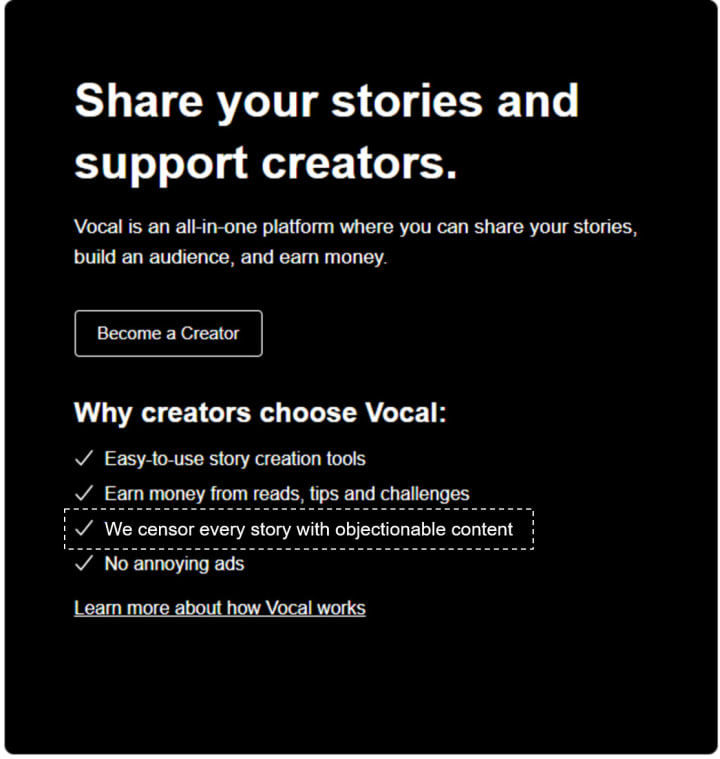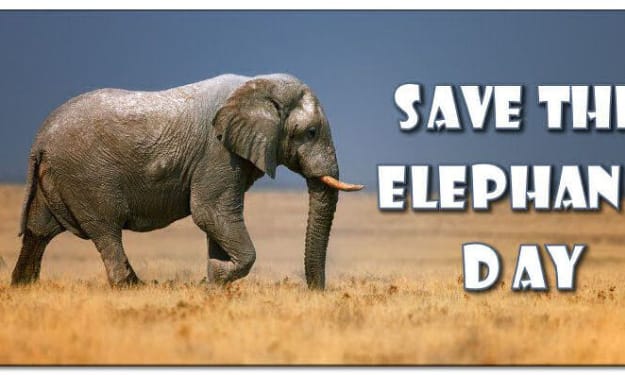Censorship as Protection
Thank You for Keeping Us All Safe from Those Things You Believe are Dangerous

Thank you Vocal.media for keeping safety top of mind for all your content creators and vast and growing readership! Truly, you are a great friend of the people and so very wise and benevolent. As a creator myself, I count myself lucky to have my stories censored by you. There can be little doubt that many of the stories you rejected for objectionable graphic or religious content, would have have resulted in some very unsafe outcomes, had they been published in their original, highly unsafe form. I can barely imagine the horrors that may have unfolded if the brave censorship boards at Vocal had not caught my unsafe writings before they were recklessly published on the internet for anyone to see and use for whatever unsafe and no doubt nefarious purposes they might.

Given how effective and well respected censorship is a technique of control and repression I was surprised to learn that it is not as popular as it once was. Like Vocal, in the modern era censorship is used mostly to keep us all safe. Given this I thought I would find many examples and discussion of its role in public and private safety online. However, as I discovered there are many lists of the most and least common safety hazards found at home and/or in the workplace. They are all fairly similar and one finds many commonalities among the various listed hazards. Things like hazardous liquids, dangerous gasses, flammables, etc. are widely shared and widely understood/accepted to be actual and/or potential safety hazards. What I did not find on any list of potential safety hazards is any mention of writings from web based publishing platforms. In fact, no content of any sort, be it in written or spoken, old media or new, fiction or non fiction, could be found on any list of recognized safety hazards I was able to dig up.
Of course, in my effort to make a point I am being more than a little facetious. There are in fact real potential safety consequences related to the publication of specific facts about specific persons such as their names, where they live, where they work, etc. People intent on harm could use this sort of information to find, harass, and even attack their enemies or perceived enemies or random strangers for no reason at all. So, in that sense at least, "moderating every story for safety" could be a legitimate function. However, that is not at all the sense in which Vocal is "moderating" stories, or it is a very small part of it. Instead what they are doing is "censoring every story with objectionable content". Just what is and is not 'objectionable' is of course the million dollar question. In reality such a question is not answerable, at least not in a rational, reproducible way, and thus it will always be a subjective judgement call. So, what's the big deal, you might be asking yourself, if you are not yet asleep. One of the many problems is the question of who does the judging, and by what criteria do they judge. In cases of disagreement who is the "ultimate final judge?" What qualifications do each of these judges have to serve as art censors? Did they go to censorship school? Study censorship theory in their Philosophy or English department in college? What motivated them to become censors? Was it more about an innate love of censorship, or a fear of too much freedom expression? Those in the position of power in the censorship battle always argue that the "criteria are known" and they point to such and such rule book or so and so "community standards." Look, they say, here are the criteria. While better than nothing, that is only just barely.
The problem with any list of "rules" or standards or laws is that it is simply not possible to construct and codify a set of them that can address every specific, unique situation. Because of this the language used is intentionally vague. Vague language can be interpreted in many different ways by many different people. This problem is compounded, in the case of censorship, by the vagueness of the concepts being judged and the criteria used to judge them. For example, think of how difficult it is to define "religious content" or even the word "objectionable." Ultimately the problem is that Vocal is trying to judge vague concepts with debatable, non standard definitions using a list of rules full of vague language made up of many words with non standard or debatable definitions. If this were a science experiment and I saw this experimental design I would tell the researcher to go home and start over because they would not learn anything at all from the outcome. I am not naïve enough to believe that every story goes to human evaluators for censorship before it is run through several layers of algorithms first. I am sure they are all 'machine learning' softwares that 'get better over time' and 'learn by doing' etc. I actually feel sort of sorry for them, what they are being asked to do is impossible, even for a machine. Actually make that especially for a machine. I would love to see the logic behind the code of these various softwares that are used to sniff out 'objectionable' content. I have imagined it for you in the programming language of BASIC-EJ2.4
IF word = 'Jesus', 'Buddha' '.....religious figure.....'
THEN add +1 OCP (objectionable content point)
IF word = 'f*ck', 'sh&t', '.....curse word.....'
THEN add +2 OCP
IF author name = 'everyday junglist'
THEN add +25 OCP
SUM OCP
IF >50 OCP send to human censor panel
IF 10-50 OCP reanalyze
IF <10 OCP approve for publication
If you work for Vocal and serve on one of these censorship panels or are involved in censorship discussions I have some advice. If telling yourself that you are censoring peoples work for reasons of safety makes it easier for you to live with yourself and actually sleep at night instead of being racked by guilt and nightmares than fine, you are free to delude yourself 'til the cows come home. But, if you want to learn to write run on sentences like the one just prior to this one, you need to come talk to me first. Delusion is not an option. LOL!
About the Creator
Everyday Junglist
Practicing mage of the natural sciences (Ph.D. micro/mol bio), Thought middle manager, Everyday Junglist, Boulderer, Cat lover, No tie shoelace user, Humorist, Argan oil aficionado. Occasional LinkedIn & Facebook user






Comments
There are no comments for this story
Be the first to respond and start the conversation.